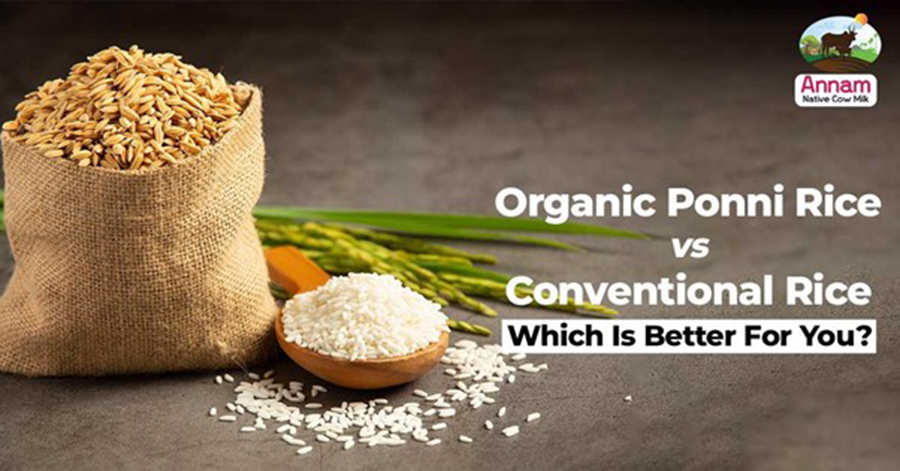Date: 04 Oct 2024
Category: OrganicOrganic Ponni Rice vs. Conventional Rice: Which Is Better For You?

Ponni rice is the main food for many people as it stands out for its soft texture and excellent flavor. However, due to increased globalization there are many commercial methods to produce Ponni rice and it becomes a tough choice to choose between organic Ponni rice and conventional rice. Hence, this blog will explore the distinct variations between organic Ponni rice and traditional rice to help you make a knowledgeable decision.
What Is Ponni Rice?
Ponni rice is a popular white rice variety grown in the southern states of India, especially in Tamil Nadu and Karnataka. It is extensively used in normal food due to its smooth texture and distinct flavor. Its medium-grain length and rich nutrient profile make it a preferred choice among many families.
Organic Ponni Rice vs Conventional Rice:
Natural Farming vs Chemical Fertilizers
Organic Ponni rice is grown using natural fertilizers like compost and animal manure, which enrich the soil without harming the surroundings. This results in a more nutrient-rich crop that is free from chemical substances. On the other hand, traditional rice is based heavily on synthetic fertilizers and insecticides, which not only consume the soil’s nutrients significantly over time but also can leave chemical residues on the rice. These residues offer potential risk on the consumers if consumed in the long term.
Pesticide-Free vs Chemical Exposure
One of the advantages of organic Ponni rice is its cultivation without synthetic pesticides. We use natural pest controllers, decreasing harmful chemicals in the food. On the other hand, conventional rice is usually grown with artificial pesticides that may leave residues in the grains. These chemical substances affect the surroundings, contaminate water bodies and harm the creatures living within it; however, they also expose consumers to potentially toxic substances that may accumulate in the body over time.
Sustainability vs Environmental Harm
Organic farming practices prioritize sustainability using crop rotation, organic manure, and natural pest control that promote soil wellness and biodiversity. It makes organic Ponni rice a more eco-friendly alternative. On the other hand, traditional rice farming can result in environmental damage, which includes soil degradation, water pollution, and biodiversity loss. The heavy use of chemicals in conventional farming also can disrupt neighborhood ecosystems, and contribute to long-term ecological imbalance.
Higher Nutritional Value vs Nutrient Loss
Organic Ponni rice is regularly richer in antioxidants, nutrients, and minerals as they are cultivated through natural farming methods that specialize in preserving soil health. Conventional rice, however, is not nutrient rich as organic Ponni rice because of the repeated use of chemical fertilizers and pesticides, which weaken the soil's potential to sustain healthful plants over time.
Better Taste vs Chemical Flavor Interference
Many find that organic Ponni rice has a superior taste compared to conventional rice. The absence of chemical substances retains the natural flavors of the rice, making the meal extra delicious. In contrast, traditional rice can take on the taste of the chemical compounds used throughout cultivation, leading to a less flavorful product.
Hence, when it comes to making a choice for your health and well-being, organic Ponni rice clearly stands out as the ideal option. Its natural farming practices, absence of harmful chemicals, and nutritional value make it a best choice for you and your family. If you're looking for a lifestyle that prioritizes wellness, organic Ponni rice is the way to go. For the finest quality organic Ponni rice, choose Annam Milk the best provider of organic milk in Chennai and various organic products like rice, vegetables, fruits, ghee, paneer, curd and many more. With Annam Milk, you can trust that your rice is cultivated with care and integrity at our organic farms in Chennai, supporting both your health and the environment.



